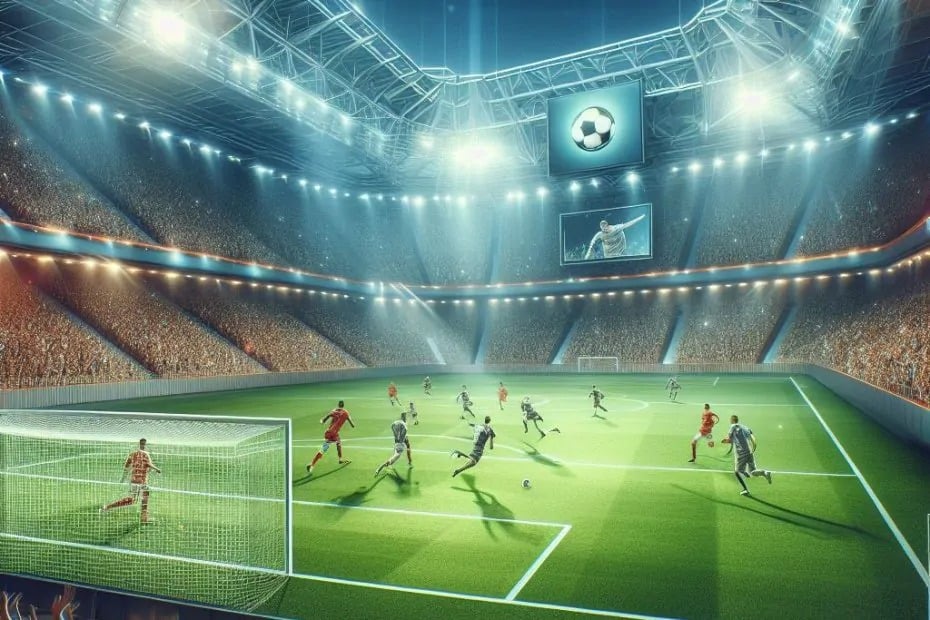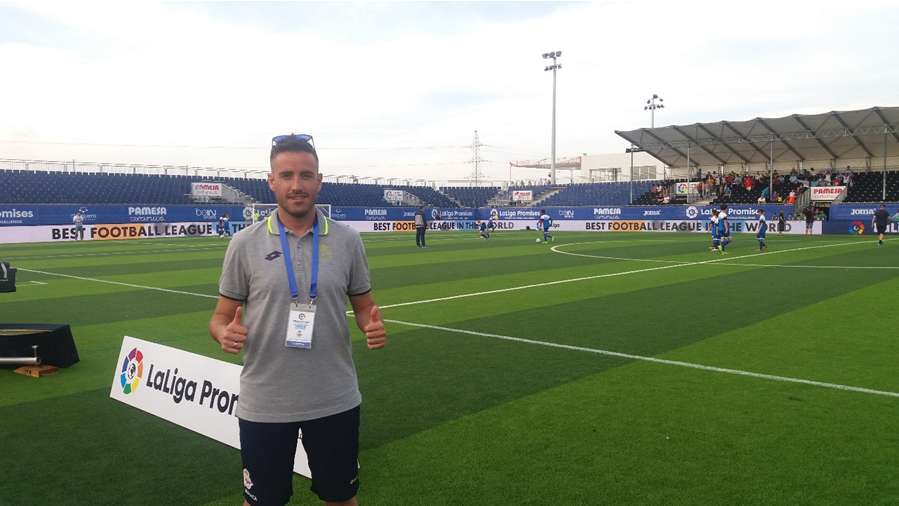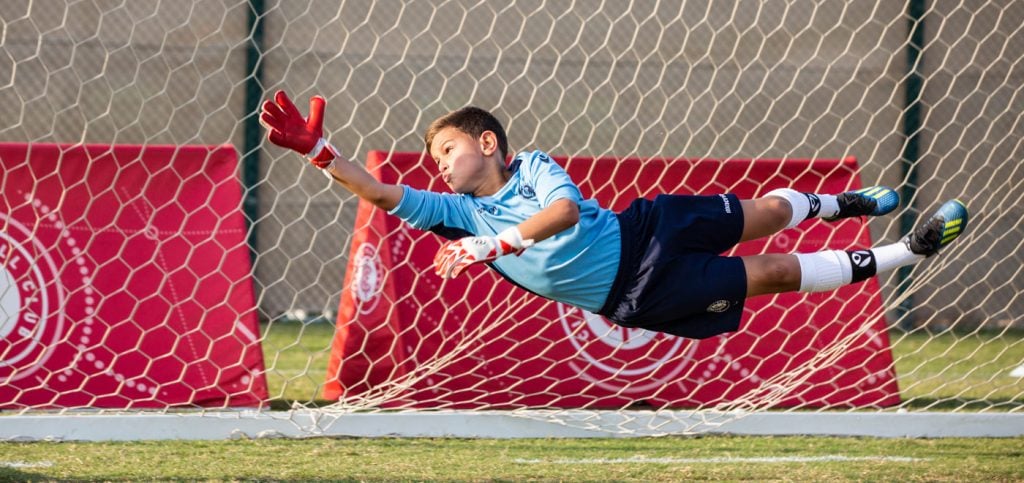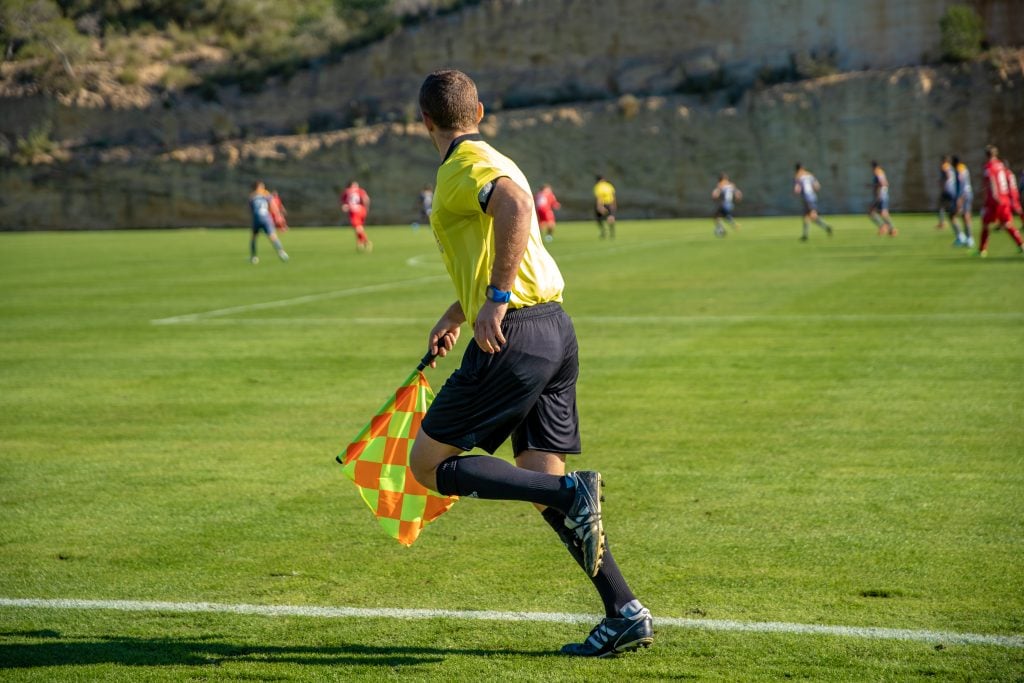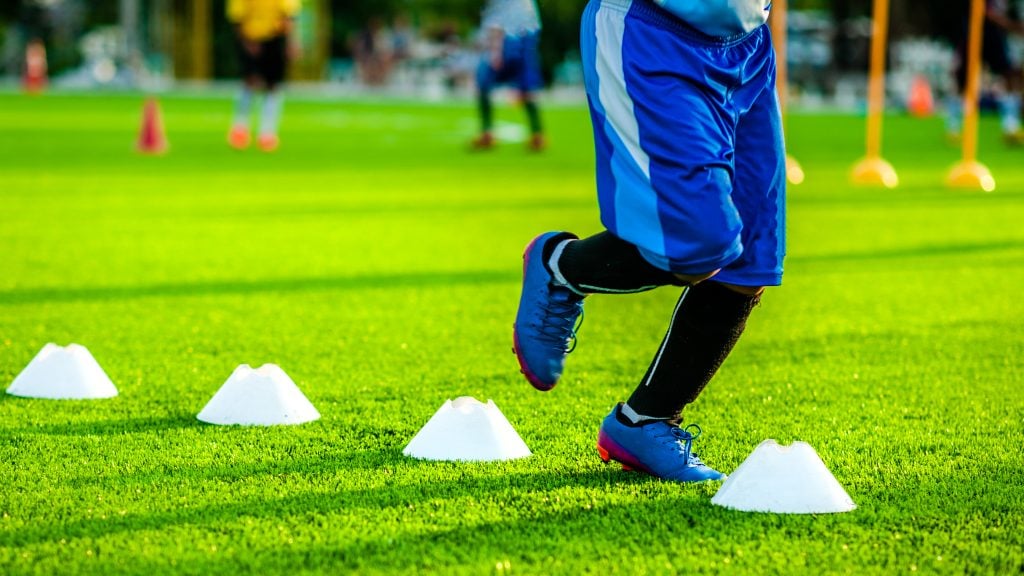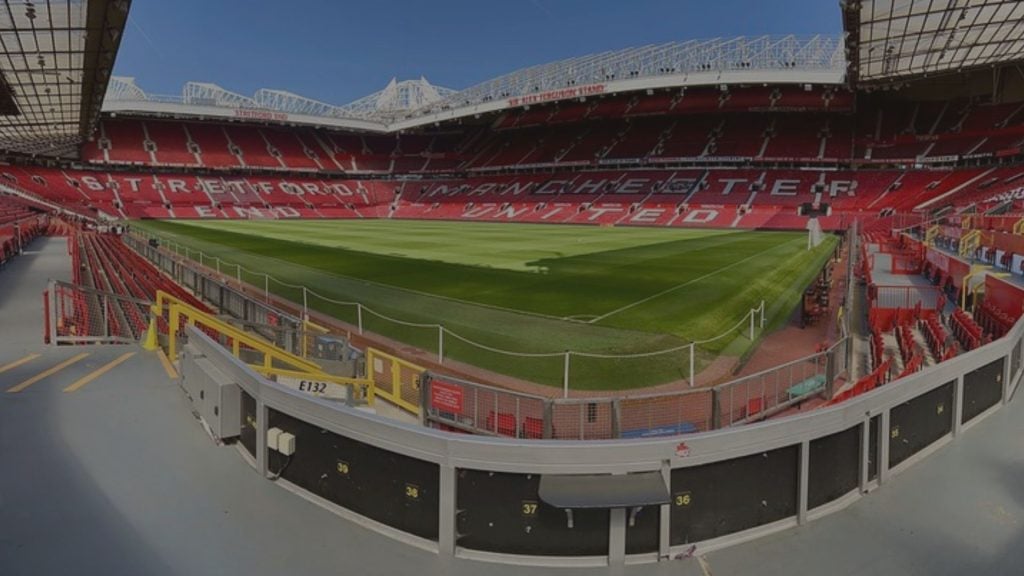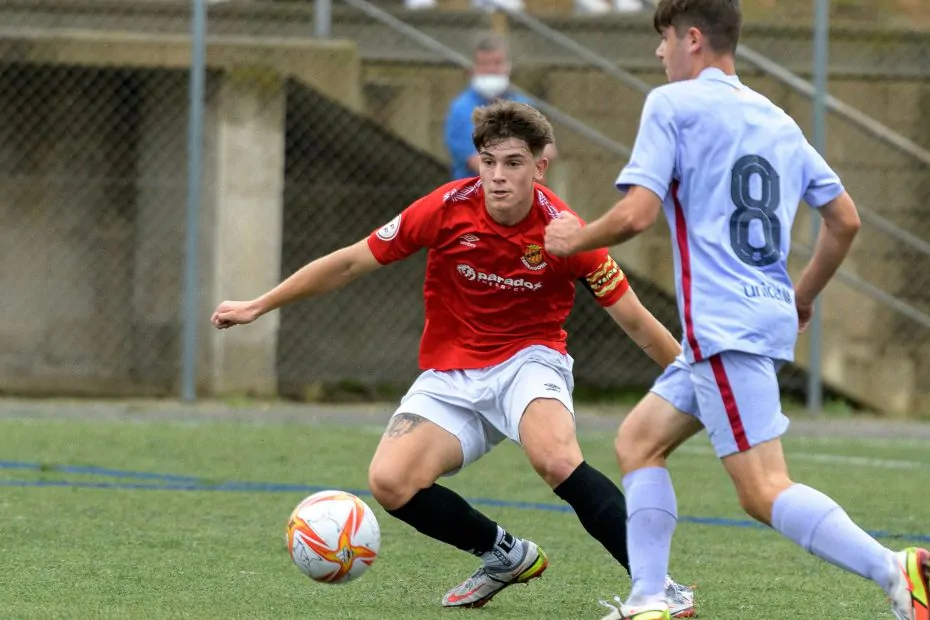Of course, there are differences in camp approaches depending on location.
Europe is a continent where soccer is a traditional sport that has been played at the highest level for over a hundred years.
In the United States, soccer is an emerging sport that has steadily gained popularity in recent years, but still has a lot of ground to gain behind other disciplines.
All of these situations directly influence the approaches, training methods and level of play offered by each training.
That is why in this post we will talk about the differences that exist between soccer camps in Europe and the United States.
The goal is for parents to have all the tools and information at hand to decide which camp to send their children to and prepare for all that such an event has to offer.
We will review the main discordances between the continents, highlighting the positive and negative aspects of each region.
Afterwards, we will leave you with an updated ranking of the best soccer camps in Europe and the USA. Soccer camps are ideal for boys and girls who want to raise their level of play under the guidance of certified coaches and an effective training program.
Key differences between soccer camps in the USA and soccer camps in Europe.
- Training structure: Training methods vary between continents. In Europe they tend to be more focused on technique, while in the U.S. a comprehensive approach is proposed.
- Relationship with professional clubs: Camps in Europe are offered by large and prestigious clubs with prolific youth academies. Most U.S. camps are run by MLS teams or private academies.
- Competitive level: The demand in European soccer camps is very high from a very early age. In the United States the competition is not as rigorous and there is less pressure on the players.
- Coaching education: Coaches in Europe may be certified by UEFA or other reputable league or federation organizations. Coaches in the United States are prepared by the MLS clubs themselves or private entities.
Coaching structure.
European training sessions are more rigorously focused on soccer.
Soccer is the flagship sport of virtually the entire European continent. For this reason, the kids have this discipline as part of their culture, which makes them become familiar with the basic concepts, rules and other notions of the game in a more natural way.
For this reason, training in Europe has a much more technical and tactical focus. From an early age, kids are trained to polish their skills and movements training after training.
There are proven methodologies used by large institutions or professional clubs that are applied solely to develop players from the youth level, with the aim of bringing out their full potential when their age allows them to do so.
In addition, the tactical aspect and teamwork is something that is also trained with great emphasis in Europe.
The academies have their own ideologies of play that have been designed and modified over the years to promote better performance of the children on the field.
All of this is combined with exercises to improve physical endurance, but always in the service of technique.
Players acquire specific skills throughout their training. Based on all these concepts, the coaches discover the full potential of the players to make them reach the top.
In this way, they will be technically and tactically prepared to cover different positions on the field and finish developing in higher categories, where training is even more demanding and more advanced in terms of technique.
Finally, the camps also offer excursions and complementary recreational plans, although they always take a back seat to the soccer development of the participants.
- Special focus on the technical aspect of the players from an early age.
- Teaching of on-field tactics and the importance of teamwork.
- Physical conditioning at the service of technique.
- Training programs tested and modified over the years.
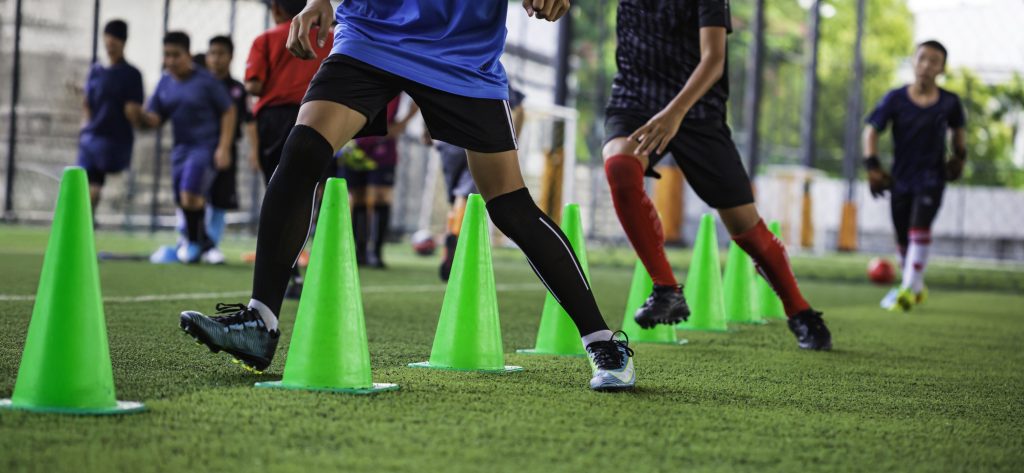
In the United States, a comprehensive approach to teaching is proposed.
Soccer academies and camps in the United States have a more comprehensive and generalized approach to teaching soccer.
As it is a sport that is not at the heart of their culture, training at an early age is not as strict as in Europe, and they opt for more recreational and complete experiences to bring the kids closer to this discipline.
Of course, the campuses in the United States review the basic notions of technique and tactics, but from a generally less demanding prism than in the old continent, where there is a higher level of play due to different situations.
In the same way, the coaches prepare the children and provide them with enough knowledge to develop throughout all their formative categories, with a level of competition that has increased in the last few years.
In addition, many public and private entities have bet on soccer in recent times, which has increased the influx of children to camps and academies, creating a better pace of competition among all boys and girls.
In addition, the soccer camp experience in the United States is complemented by the recreational activities and leisure plans offered at these events.
From visits to amusement parks, theme parks, natural landscapes or evenings at night; the kids have their space to experience new things and relate sports with fun.
- Training is more comprehensive and not so demanding on the part of the coaches.
- The recreational aspect is fundamental in most camps.
- The level of play has been growing in recent years.
- They rely heavily on technology to analyze the performance of the players.
Relationship with professional clubs.
Most of the camps in Europe are offered by major clubs on the continent.
One advantage that the European continent has over the United States is that the camps are offered by large clubs that have very solid structures in their training categories.
The kids, by showing their talent in these camps, have the direct opportunity to enter the academy of these clubs; which would be a very important step towards the goal of making their debut at the professional level.
Once inside a club’s academy, the only thing left is for the player to work hard enough to stand out from his teammates and continue progressing until he tries to make it to the first team.
At the same time, it is also possible that the player may be transferred to another club during his training process; it all depends on the needs of the club and the talent shown by each player.
On the other hand, with regard to training, European clubs usually have more demanding and proven training methodologies for the development of their players.
The big clubs bet on a tactical periodization model that prepares the kids for the high competition sport, keeping the same playing philosophy in all their categories.
Learning under one of these methods can also be very fruitful in a young player’s career.
At the same time, in Europe there are also private institutions of great prestige and trajectory, with a close relationship with the clubs, scouting networks and very effective training methods.
These are situations that should be weighed before deciding to enroll in a camp.
- Camps are directly related to club academies.
- Players have the opportunity to join club academies.
- Joining an academy is positive for a player’s development.
- High level of competition.
Camps in the United States relate to MLS clubs and European branches.
In the United States, camps are offered by both MLS clubs and private institutions, each with their respective connections to the professional world.
The private institutions train players to introduce them to scouts from clubs around the world. Their goal is to make the boys stand out for their level and place them in academies in different countries around the world.
One advantage of private institutions is that they have more individualized and personalized training programs. Therefore, they focus on the more specific development of each player, analyzing the strengths and weaknesses of each one of them.
This favors the growth of the children, since they will have a higher level of attention and supervision to strengthen their technical aspects.
On the other hand, in MLS clubs, academies use camps to recruit players for their academies.
These academies have very solid and effective training structures that have allowed for this sustained growth.
In addition, in the country there is also the possibility of opting for a university scholarship. In this way, both the sports and academic training of your child would be fully covered.
Therefore, soccer camps in the USA are a highly recommended soccer development experience, which offers many amenities and positive things to the attendees.
- Camps offered by MLS clubs and private institutions.
- Solid and effective minor soccer structure.
- Lower competitive level than in Europe.
- More individualized training.
Competitive level and culture of competition.
In Europe, competition is much higher from an early age.
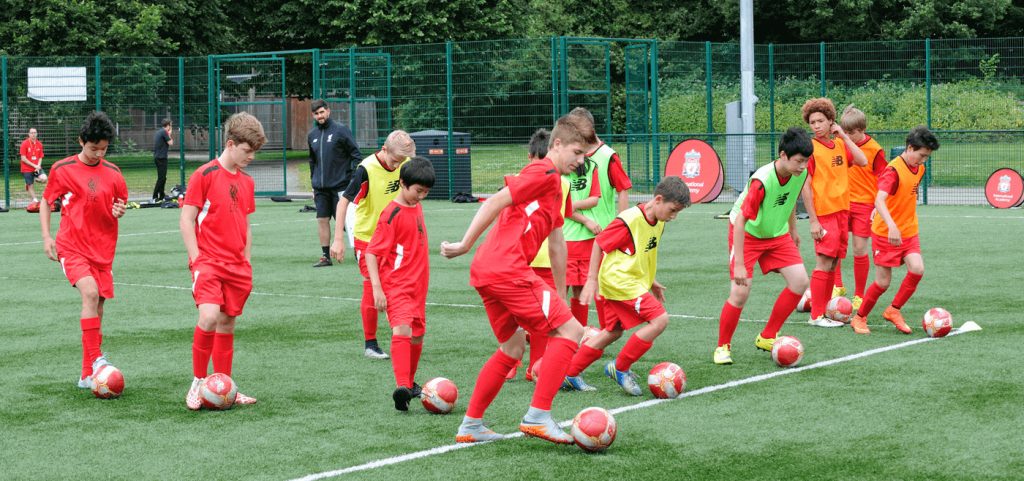
The culture of competition in Europe is much greater. Children feel the need and obligation to stand out above their peers, making the maximum effort in training to be the best.
Soccer, being so closely related to the culture, creates an atmosphere of high demand even at the junior level. As a result, the children are subjected to a certain amount of pressure and expectation from the very beginning.
For this reason, the competitive level in Europe is very demanding and ends up bearing fruit at the professional level, with players who are very well prepared and experienced to perform at the highest level.
However, such a high level of intensity can be detrimental to kids who are not yet ready to be in such a competitive and challenging environment. Of course, this intensity varies from camp to camp, but a standard of sorts is maintained.
When it comes to soccer development, it is always best for kids to be in the most competitive environment possible. Competing with the best makes players try their best and learn from the strengths of their peers.
In addition, having frequent competitive exposure to high-level players allows kids to get used to the high tempo and develop their skills more easily.
To put it in professional jargon, training with the F.C. Barcelona first team is not the same as training with a semi-professional team. The intensity, competitive level and demands of training vary; and having that constant contact with great players allows you to learn from them.
For this reason, soccer camps in Europe are the best option for future soccer players if we focus fully on the competitive factor.
- High intensity training and competitive level.
- Competition is higher from an early age.
- Rubbing shoulders with high-level players allows kids to reach their full potential.
- Competing at the highest level helps them gain more experience and better handle pressure.
In the United States, the level of competition is not as demanding.
Soccer in the United States is not at the top level of importance. The country is not internationally recognized for its great players or for having a fearsome national team in world championships, even though they have an intermediate/high level.
For this reason, the expectation and competitive sense of the American player is not as demanding as the European or other territories.
The boys manage their evolution in training in a calmer environment and without so many pressures.
This situation is positive because it allows the kids to have their own pace of learning, having fun and enjoying their favorite sport with their teammates.
Such motivation can become the fuel needed to be disciplined and improve day after day.
However, from a competitive aspect, it can be a disadvantage compared to European camps.
By having a less demanding approach, the kids are not exposed to such a high level of competition and do not get to be in that environment necessary to give the best of themselves.
Therefore, they may not exploit all their skills at the right times and this may have an impact on their overall development as a player.
However, as there is less competition and level, if they manage to stand out enough, they have a high probability of reaching the professional level, which is much more difficult in Europe.
In addition, the quality of life as a professional soccer player in the United States is very positive and recommendable.
- Training with less competition.
- The kids develop at their own pace, without so many pressures or imposed expectations.
- Greater likelihood of professionalization.
Training of coaches.
In Europe, coaches are certified by UEFA and other prestigious bodies.
The level of instruction of the coaches is also a differential factor in favor of European soccer camps.
In Europe there are regulatory bodies, courses and certifications that make sure that coaches are trained and that they have all the necessary knowledge to take the kids on the right path, soccer wise.
From multiple UEFA Pro certificates to courses run by prestigious academies, coaches have a comprehensive training that allows them to apply the training programs with high effectiveness.
In addition, the coaching staff also includes former players with professional experience in the First or Second Division of elite countries.
The combination of an effective training methodology with qualified coaches creates the ideal formula for the development of young talent in the sport.
- Coaches certified by UEFA or other prestigious bodies.
- Former players are part of the coaching staff.
- Proven methodologies with successful and experienced coaches.
In the United States, coaches are trained in the country.
Although there are camps and academies that recruit foreign staff, most U.S. academies are staffed by U.S.-trained personnel.
Coaches are nationally certified and have local experience, with some being former MLS players or experienced coaches from their schools.
Their training methods are constantly improving and evolving with the support of technology.
Some camps use European methodologies, taught by national coaches.
- Coaches trained in institutions in the country.
- MLS experience:
- Camps influenced by European methods.
Comparative table Soccer Camps in the United States vs Soccer Camps in Europe.
| Key aspects | Europe | United States |
| Proficiency level. | Very high from an early age. | High, but not so demanding. |
| Training of coaches. | Certified by UEFA, FA, RFEF and other elite bodies. | Coaches trained in the USA by national bodies and clubs. |
| Relationship with professional clubs. | Direct connection with high-level clubs. | Relationship with MLS clubs and around the world. |
| Training approach. | High intensity and technical-tactical development. | Integral method based on fundamentals. |
| Recreation and leisure. | Include field trips and excursions. | Recreational approach with guided tours and more. |
| Facilities. | First class facilities. | First class facilities. |
Best Soccer Camps in Europe.
After reviewing the most important differences of soccer camps in Europe vs. the United States.
Europe is a prolific soccer continent with elite level countries in the sport. In the following section we leave you with some soccer camps in Spain, in addition to other alternatives of soccer camps in England.
1. Best High Performance Camp in England: Soccer School in UK.
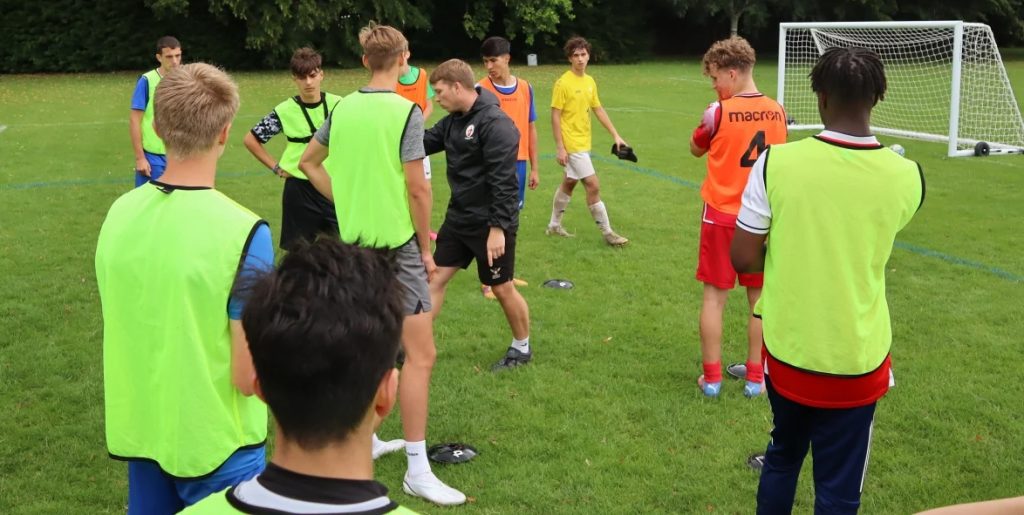
This high performance soccer camp in England is ideal for players from 12 to 17 years old who want to live an intense first level soccer experience together with their peers who want to push themselves to the maximum in the UK.
This High Performance Campus in England is for boys only, with the participation of the best professionals sent by the most prestigious private soccer academies in Europe.
In this way, the campus is an excellent opportunity to improve in a short period of time, acquiring knowledge from elite professionals who reinforce the technique through specific exercises.
In turn, all players work on their fitness and strength with preparation sessions during the program, including nutritional guidance and an evaluation report at the end of the camp.
- Only for children from 12 to 17 years old.
- Ideal for high level/elite players.
- Professional trainers sent by top level academies.
- High intensity and intermediate program with language classes.
- Participan las academias de Steven Gerrard, Brook House College, Dubai City y más.
- Coaches with UEFA A or UEFA B License.
- Training focused on improving the technique and physical fitness of the players.
- Talks on nutrition and the importance of a balanced diet in high performance sports.
- Focus on mental health.
- Optional language classes.
- The plan includes lodging and meals during the entire campus.
The camp also offers excursions, such as a visit to London’s iconic Wembley Stadium, among other complementary activities.
Transforming dreams into goals
2. Best High Performance Camp in Spain: High Performance Camp in Barcelona.
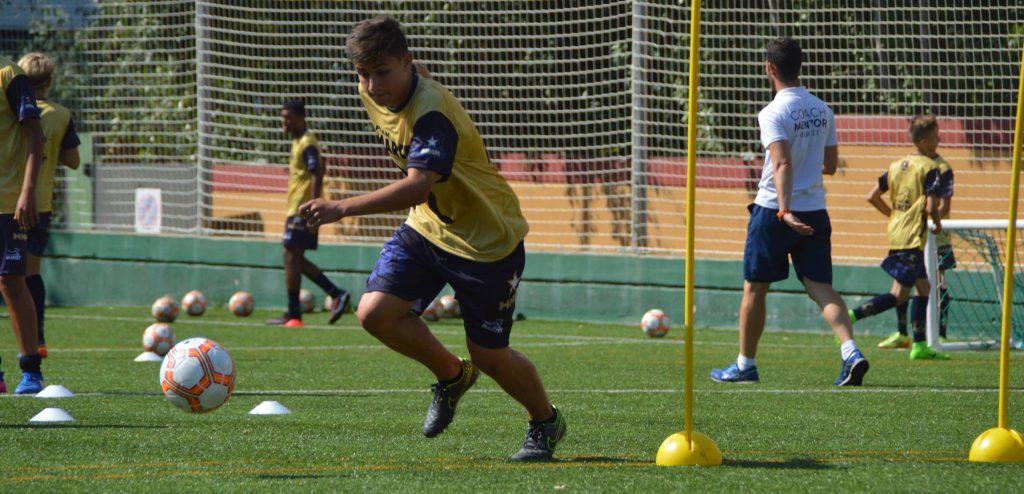
The High Performance Soccer Camp in Barcelona is run by a prestigious private entity with decades of experience in the training of players.
Their philosophy believes that talent is not something you are born with, but the product of consistent effort and intelligent learning.
This methodology has been praised by soccer greats such as Vicente del Bosque and Sven Goran Eriksson.
The training sessions have a high intensity and a high competitive level, focused on the advanced technical development of the players and elite tactical positioning.
- For boys and girls from 8 to 21 years old.
- High competitive level.
- They have trained professional players such as David Soria and Oliver Torres.
- 30 hours of weekly training.
- UEFA certified coaches.
- Accommodation and food included.
- Focus on mental health and sports psychology.
- Optional language classes.
The boys stay at the Ágora Residence in double, triple or quadruple rooms. They have all the amenities, common areas, internet via WiFi and all meals covered.
Transforming dreams into goals
3. Best Goalkeeper Camp in Spain: High Performance Camp in Valencia.
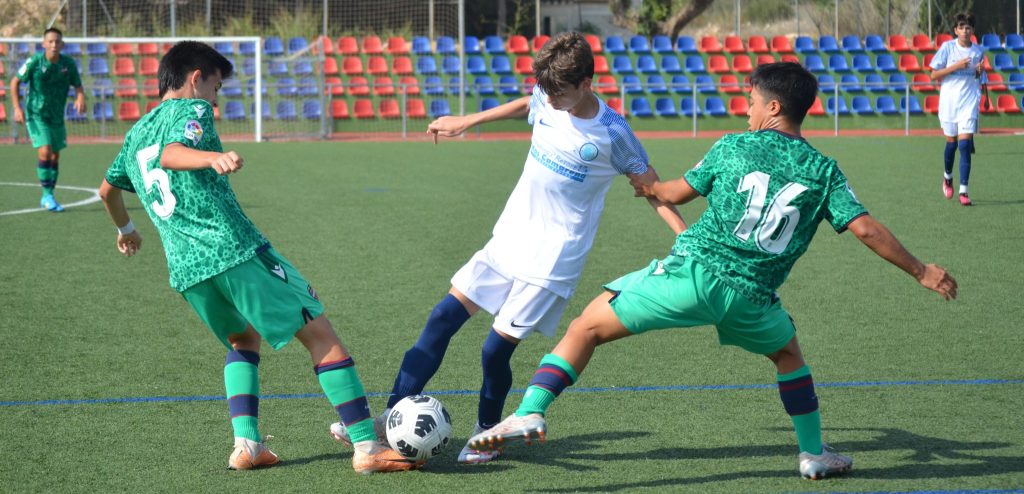
This Valencia sports campus professes a tactical periodization method influenced by the training program of F.C Porto, one of the most prolific youth academies in Europe.
Its training sessions are demanding and highly competitive. It has a special program for goalkeepers in which they improve their technical repertoire, speed, reaction, reflexes and positioning in the goal.
Its coaches are UEFA Pro Licensed and have a special focus on physical conditioning and injury prevention.
- Elite competitive pace.
- Different plans including special plans for goalkeepers.
- Accommodation at the Mas Camarena Resort.
- First class facilities.
- Technical and tactical development.
- Food designed for high performance sport.
- Optional language classes.
Transforming dreams into goals
4. Best Camp in England: Liverpool F.C.
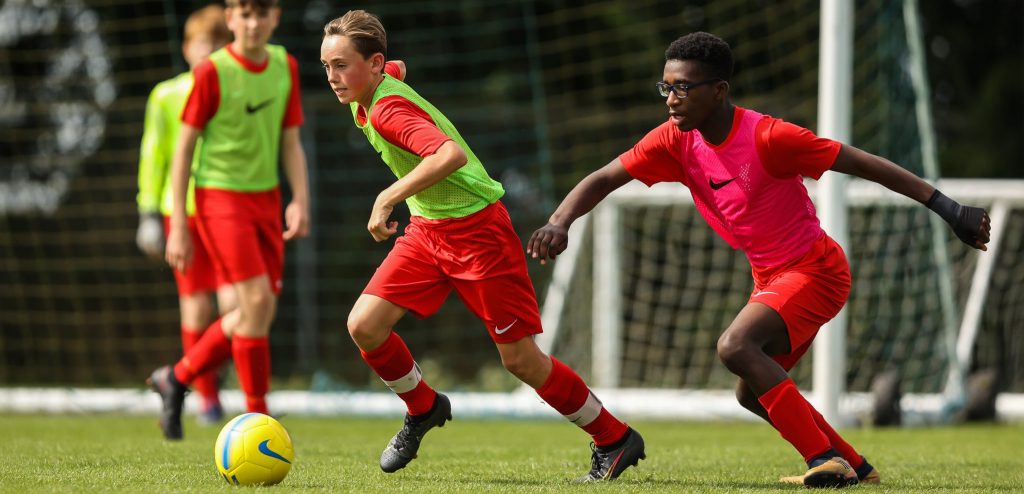
The Liverpool summer camp has a very interesting proposal for boys and girls, with a very complete training method.
The training sessions are intense and highly competitive, with coaches certified by the club and with vast experience in the area.
In addition, recreational activities, excursions and much more are also included, making it an unforgettable adventure for the kids.
- Admits players from 12 to 17 years old.
- Programs for boys and girls.
- Managed by club-certified staff.
- Accommodation at the Repton School.
- Very limited availability of places.
- High intensity training sessions.
- Optional English classes.
- From 15 to 20 hours of training per week.
- Includes excursions and recreational activities.
Transforming dreams into goals
5. Camp with better facilities: Chelsea Foundation.
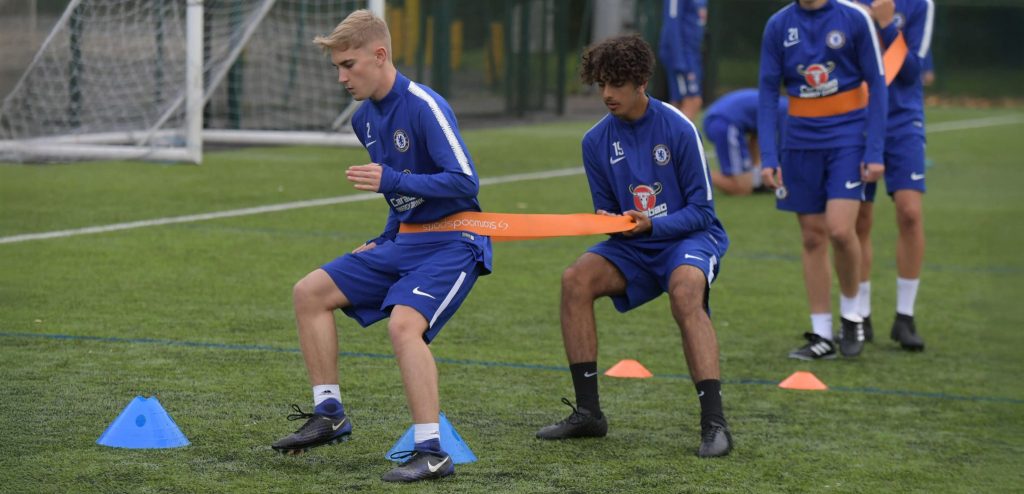
The Chelsea Campus offers an ideal experience for boys and girls who want to raise their soccer level and have a high level experience.
The camp has the most modern facilities in the country and a trained staff to train the players in all aspects of the game.
The coaches review the skills of technique and tactics, raising the level of training as the sessions progress.
- Modern facilities of the highest level.
- High degree of internal competition.
- 29 hours of training per week.
- Accommodation at the Chatterhouse School in Surrey.
- Optional language classes.
- Three meals included.
Turning dreams into goals
6. Best Academy in Development: Arsenal Football Development.
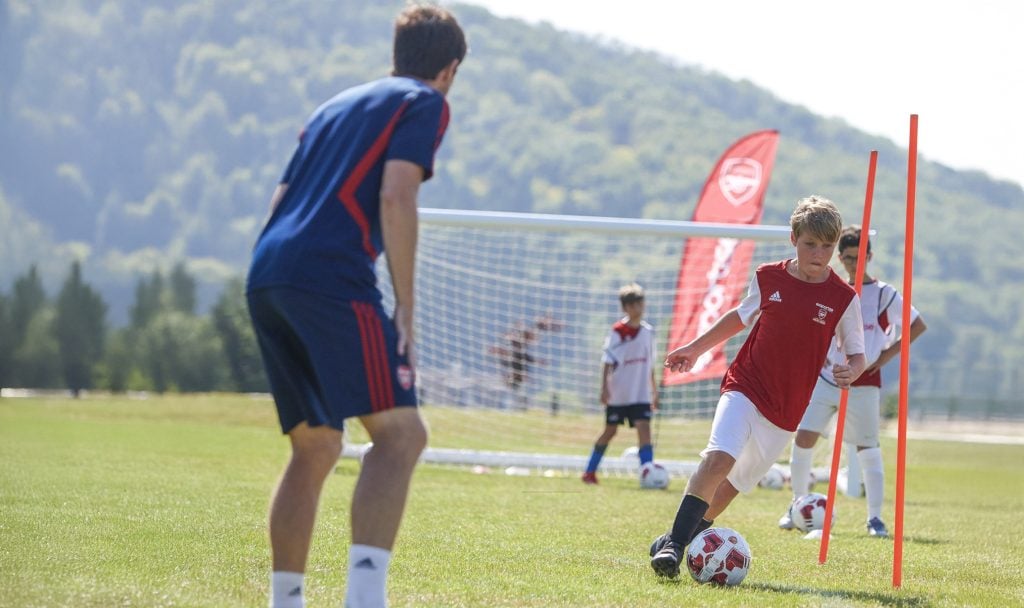
Arsenal is a club internationally known for its potential to develop young talent, with exponents such as Bukayo Saka in soccer today.
They have programs for boys and girls that focus on the development of technical and tactical skills, with special emphasis on the importance of teamwork and group effort on the pitch.
In addition, the Arsenal Campus uses a tactical periodization method that instills their philosophy of possession play and quick transitions in the players.
- For players from 9 to 17 years old.
- Official club coaches.
- High competitive level.
- Promotion of competitive spirit and fair play.
- Talks on mental health.
- Review of technique and tactics.
- Medium-demanding physical conditioning.
- Optional language classes.
- Accommodation at Repton School or Radley College included.
Turning dreams into goals
Best Soccer Camps in the United States.
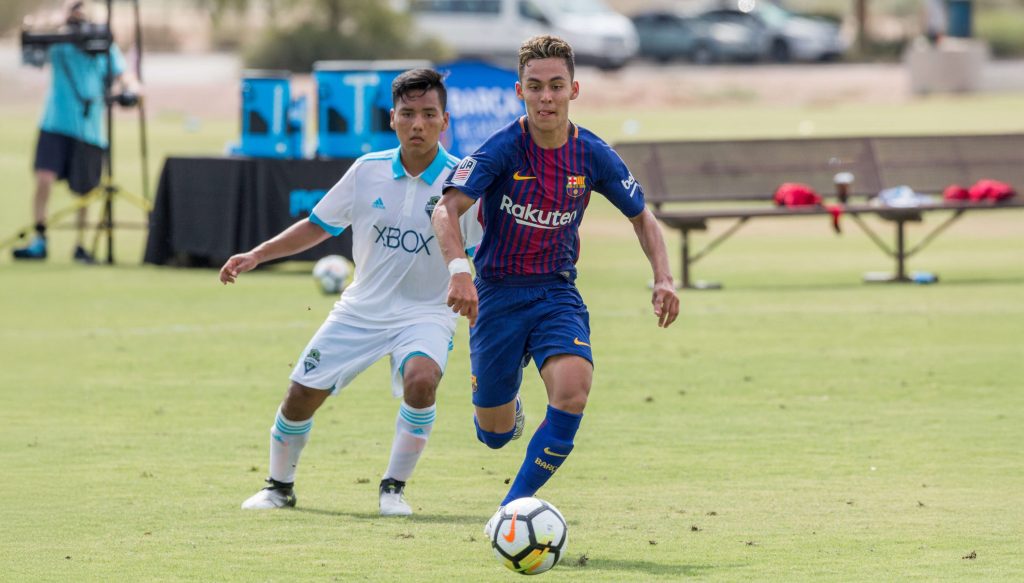
1. Best High Performance Camp in the USA: F.C Barcelona.
The High Performance Camp offered by the F.C Barcelona Academy in Arizona is the best option for a player to develop soccer in North America.
The academy follows the guidelines of La Masia, the Catalan club’s youth academy, with a tactical periodization method that emphasizes possession play and high pressure on defense.
The camp is highly competitive among the players and gives great visibility to the players, who will be seen by the academy’s scouts.
- Intense training with more than 20 hours per week.
- The academy is recognized for training great players such as Lionel Messi, Andres Iniesta or Lamine Yamal.
- Coaches certified by the club.
- The only F.C Barcelona academy in the USA.
- Lodging at Grande Sports World, a first class facility.
- Optional language classes.
Transforming dreams into goals
2. Best High Performance Camp in Virginia: PSG Academy.
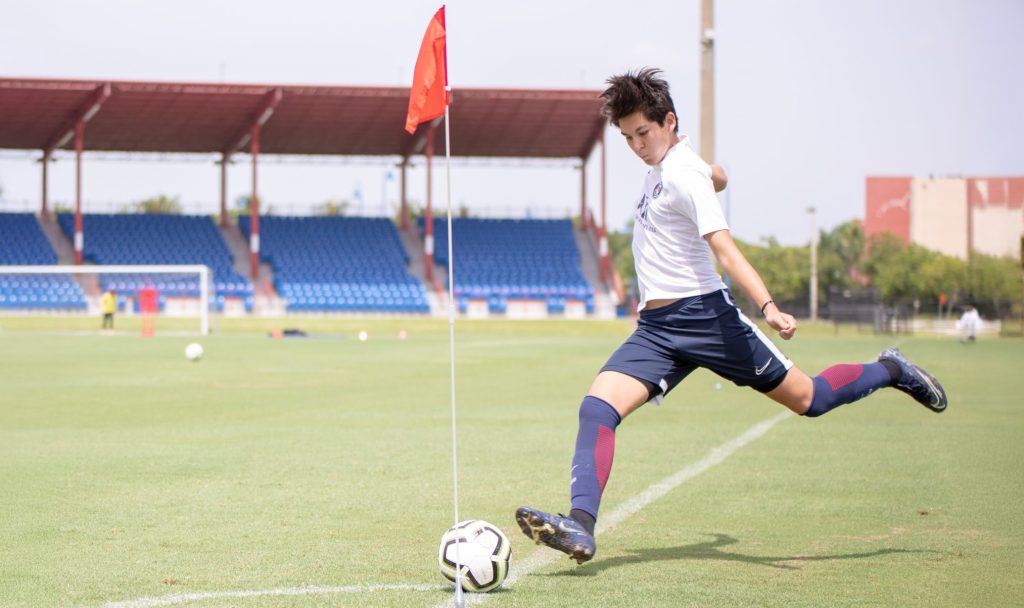
The PSG high performance campus in the United States has gained much relevance and prestige in recent years, being one of the lungs of the formative categories in the club’s structure.
Its coaches have been certified by national and international organizations. Its high performance regime demands physical training from the players.
In addition, technique and tactics are trained in equal parts, resulting in an optimal and complete learning process.
- High competitive rhythm.
- Technique and tactics are trained with the same level of importance.
- Physical conditioning for high performance sports.
- Multicultural environment.
- Lodging and meals included.
- First class facilities.
- Talks on mental health.
- Optional language classes.
Transforming dreams into goals
3. Best Private Academy Soccer Camp: IMG Academy.

IMG Academy has modern, state-of-the-art facilities in Florida, USA; with close relationships with professional clubs in the country.
It has programs of different lengths and in multiple categories; with a training program that adapts to all ages.
In addition, its coaches focus on individually analyzing the boys and girls; in order to develop their entire repertoire of skills to the maximum.
- Private academy of great trajectory.
- Connections with MLS clubs.
- Camps at different times of the year.
- Medium intensity training.
- Ideal for beginners and intermediate level players.
- First class facilities.
- Optional language classes.
- Lodging and meals included.
Turning dreams into goals
4. Coerver Coaching Academy Camp.
The Coerver Coaching Academy has earned the trust of the U.S. soccer world with a decades-old method of coaching.
Focused specifically on the technical side of the game, Coerver Coaching Academy coaches go from the basics to the most advanced, training the player’s development phase by phase.
From simple ball control to the most advanced tactical positioning in specific situations. The player develops progressively to reach the professional level.
- Method proven by its coaches for decades.
- Institution with a vast international trajectory.
- Excellent academy for beginners.
Transforming dreams into goals
5. Best Camp for girls: De Anza Force Soccer.
We close the list of recommendations with an all-girls camp at De Anza Force Soccer.
This institution is recognized in the soccer world for being the seedbed of stars such as Alex Morgan or Kelley O’Hara.
Its training method has been proven over the years and enjoys great international prestige, training players of all nationalities.
- Complete training with priority on technique and tactics.
- Multicultural and inclusive environment.
- Proven training method.
- Certified coaches and former players on staff.
Transforming dreams into goals
The Best Soccer Camp is just clicks away.
Every parent wants to ensure the best possible experience for their children. With all this information, you now have everything you need to get them on their next adventure.
Analyze all the pros and cons of each camp and select the option that best suits your child’s soccer development.
Of course, you must also take care of their education and well-being during the whole process; maintaining a fluid and direct communication with your child.
This is the only way to ensure that his dream of becoming a great soccer player slowly becomes a joyful reality.


